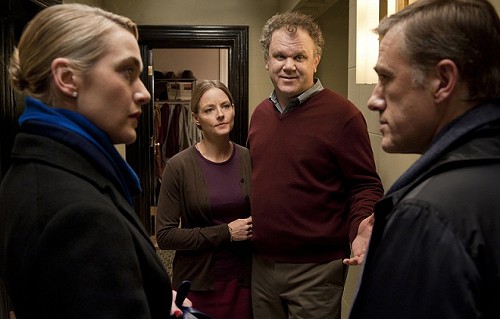Carnage/2011/Sony Pictures Classics/80 min.
By Michael Wilmington
“Carnage” shows us once again what a master Roman Polanski is of the claustrophobia of anxiety – even though this time the fear he paints is more comic and light-hearted than the sheer grinding terror of say, “Repulsion” or “Rosemary’s Baby.” In his new movie, which was adopted by the Iranian-French writer Yasmina Reza from her hit play “God of Carnage,” director Polanski traps us, once again, in close quarters and, once again also, in a tense game and battle of social intercourse that is going to degenerate into absurdity and cruelty.
We are in the well-appointed Brooklyn apartment of the Longstreets: genial, rough-looking Michael (John C. Reilly), a salesman, and high-strung Penelope (Jodie Foster), a writer. Michael and Penelope have invited over a couple they don’t know – Alan and Nancy Cowan (Christoph Waltz and Kate Winslet), a corporate lawyer and an investment broker – to discuss the playground fracas between their respective sons, Ethan and Zachary (played by Eliot Berger and Polanski’s own son Elvis). The Cowan boy attacked the Longstreet kid and broke some teeth.
There’s tension right from the start, despite the atmosphere of good-natured civility and manners, and writer Reza and Polanski nurse it along expertly. Michael, whose eyes glower while his mouth grins, is a bit too friendly, and too loudly obliging. We sense that, though he’s talking the talk, he’s no liberal. Penelope, the real bleeding heart of the two, is wired tight, more and more uneasy and nervous.
Alan, slick, conniving and full of lightly veiled disdain for his social inferiors (almost everybody, but especially the Longstreets), keeps rudely interrupting the confab to bark orders over his cell phone. As for Nancy, she keeps her feelings tightly reined in, until the memorable moment when she suddenly projectile-vomits all over the Longstreet’s coffee table and Penelope’s treasured book of Kokoschka reproductions. From there it gets worse, and uglier, and funnier.
I’ve never seen the play, but I’m not surprised it’s an international critical and audience hit. The model, of course, is Edward Albee’s venom-laced, acidly funny chamber drama “Who’s Afraid of Virginia Woolf?” and the play that probably influenced Albee: Eugene O’Neill’s great tragic family drama “Long Day’s Journey Into Night.”
As in those two 20th century theater classics, “God of Carnage” (I prefer that title) gives us a small group of people, all hiding something, all gradually losing their inhibitions and their secrets, as they consume more and more booze.
So, one could use “Carnage” as a springboard for little essays on class warfare or the discreet charmlessness of the bourgeoisie or the beast that lies beneath all our skins or even on cell-phone etiquette. (What’s Alan like when he’s driving?) Or one could delve into the symbolism of the Longstreets’ lost hamster, a hapless creature who may be the equivalent for George and Martha’s “lost” child in “Virginia Woolf.” But, after 15 minutes of watching this filmed play, I knew why it had gotten all its awards, why Polanski wanted to do it and why he was the ideal director for the piece. [Read more…]











From FNB readers